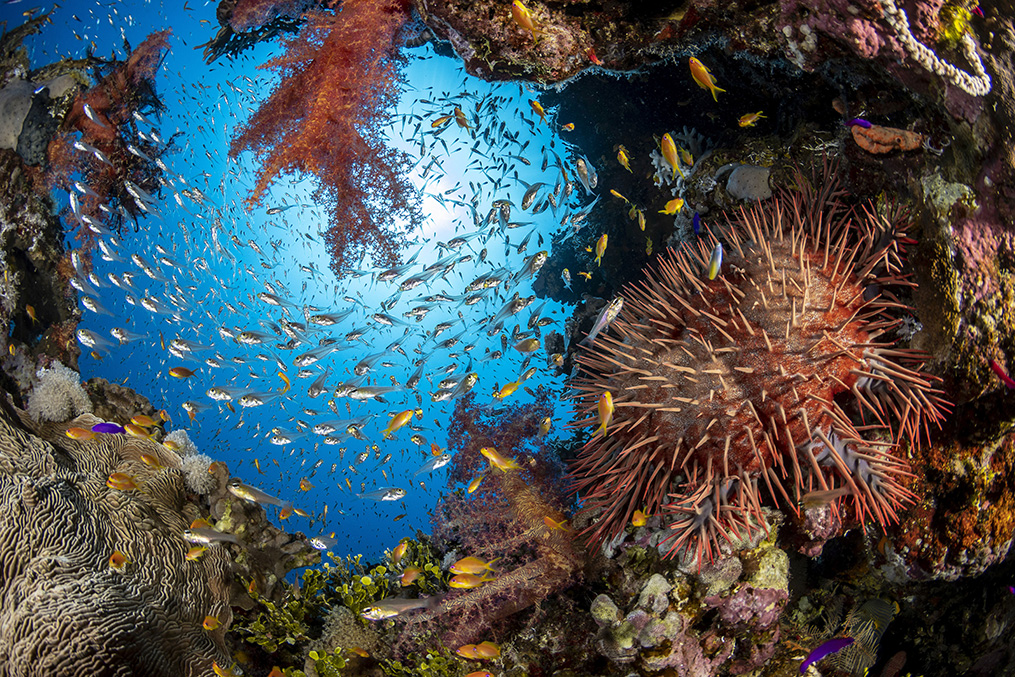Forty-four per cent of reef-building coral species globally are at risk of extinction, the IUCN Red List of Threatened Species reveals following a global assessment announced at the ongoing COP29 UN climate conference in Azerbaijan.
Coral Reef at Marsa Gozlani site, Sharm el Shekh, Egypt. Credit: Renata Romeo / Ocean Image Bank
The conservation status of 892 warm-water reef-building coral species has now been reassessed for the IUCN Red List, and analysis shows that 44% are threatened. The threats to reef-building corals were last assessed for the IUCN Red List in 2008, and at that time one third were found to be threatened.
“As world leaders gather at the UN climate conference in Baku, this global coral assessment vividly illustrates the severe impacts of our rapidly changing climate on life on Earth and drives home the severity of the consequences,” said IUCN Director General Dr Grethel Aguilar. “Healthy ecosystems like coral reefs are essential for human livelihoods—providing food, stabilising coastlines, and storing carbon. The protection of our biodiversity is not only vital for our well-being but crucial for our survival. Climate change remains the leading threat to reef-building corals and is devastating the natural systems we depend on.”
Main threats
Climate change is the main threat to reef-building coral species. The assessments considered the most recent status update of coral reefs from the Global Coral Reef Monitoring Network (GCRMN), alongside current and future threats, such as the projected increase in warming events and major bleaching events, using Intergovernmental Panel on Climate Change (IPCC) data for future warming scenarios. In addition to climate change and related severe bleaching events, corals are affected by other pervasive threats including pollution, agricultural runoff, disease and unsustainable fishing.
For example, Staghorn coral (Acropora cervicornis) and Elkhorn coral (Acropora palmata) are two Critically Endangered species in the Caribbean that have experienced significant declines due to increased warming, water pollution, hurricanes and the severe impacts of coral diseases.
“We need to drastically cut greenhouse gas emissions alongside action to address local threats if we want to give coral reefs a chance to survive,” said Beth Polidoro, IUCN Species Survival Commission Coral Red List Authority Coordinator and Associate Professor, School of Mathematical and Natural Sciences at Arizona State University.
Solutions
The main solution to save corals from extinction is cutting greenhouse gas emissions, accompanied by actions to address other threats, to strengthen species’ resilience. The assessors also recommend more research into if and how corals can adapt to warmer waters, with evidence of limited adaptation so far.
“We’ve known for decades that coral reefs are on the frontline of the global climate and biodiversity crises, and this new result only reconfirms this. Without relevant decisions from those with the power to change this trajectory, we will see the further loss of reefs, and progressive disappearance of coral species at larger and larger scales,” said Dr David Obura, Co-Chair of the IUCN SSC Coral Specialist Group.
Built over tens of thousands of years, coral reefs are the most biodiverse of marine ecosystems. Climate change causes rising water temperatures and more intense solar radiation, which lead to coral bleaching and disease often resulting in mass coral mortality. Reef-building corals have a symbiotic relationship with algae called zooxanthellae, which give corals their vivid colours. Coral bleaching is the result of a stress response to increased water temperatures, whereby the algae are expelled from the tissues.
